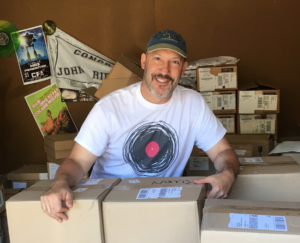 Todd Severin is the President & CEO of San Francisco Bay Area-based Ripple Music, an independent record label that specializes in heavy blues and psychedelic-based hard rock, sometimes referred to as ‘stoner rock’. Ripple Music represents an ever-growing catalog of established as well as up and coming bands such as Mothership, Wo Fat, Gozu, The Watchers, Salem’s Bend, Arrowhead, ZED, Blackwulf, and Mos Generator, all of which can be found on Ripple’s always updated Bandcamp page. I’m on their notification list, and constantly amazed at how often new bands appear on the page, and also how consistently good the various albums are.
Todd Severin is the President & CEO of San Francisco Bay Area-based Ripple Music, an independent record label that specializes in heavy blues and psychedelic-based hard rock, sometimes referred to as ‘stoner rock’. Ripple Music represents an ever-growing catalog of established as well as up and coming bands such as Mothership, Wo Fat, Gozu, The Watchers, Salem’s Bend, Arrowhead, ZED, Blackwulf, and Mos Generator, all of which can be found on Ripple’s always updated Bandcamp page. I’m on their notification list, and constantly amazed at how often new bands appear on the page, and also how consistently good the various albums are.
Despite a crazy schedule that includes a day job and just getting back from the first annual Ripple Fest in Sweden (!), the very gracious and hard working Todd agreed to answer some questions about what it means to run an independent label, what an indie label is and does, and what young bands should know about indie labels.
Mojo: Tell us a little bit about your music background. How did you get started with Ripple Music? How did it come together?
Todd: Hell if I know. I’ve just been sitting on the tracks as the Ripple crazy train came and swooped me up. Actually, I have a history in radio, a disc jockey at KSPC FM in L.A. and KSDT FM in San Diego and mostly I’m a diehard music junkie. My partner used to front a heavy metal band, Blind Justice, and is just as sick in the head about music as I am. About 10 years ago, we’d been talking about starting a ‘zine to review the masses (thousands upon thousands of LP’s and CD’s in our collections). Finally one day, I started The Ripple Effect on Blogspot, which quickly became a very cool review site. Now, it has 15 writers working on it. About a year into the Ripple Effect, a good friend said “rather than just write about the music, you should play it for people to hear“ Next thing you know, he set us up on Blogtalkradio and Ripple Radio became the top-rated music show on the station, and we‘re hanging out interviewing Marky Ramone, Fee Waybill, and others along with Ripple artists like Tony Reed and Kent Stump. Had a ball.
Within about another year, one thing led to another and JPT Scare Band, an amazing proto-metal, acid blues, heavy psych band from the 70’s dropped a stack of unreleased masters on my desk with the words “Put this out for us,” so, with that, we started the Ripple Music record label and JPT’s Acid Blues is the White Man’s Burden was our first release on glorious yellow and green translucent vinyl, psychedelic double LP. That was 2010. And we’re off and running … All started by a love of seriously heavy riffs.
What are the services you offer to the bands on your label?
Quite honestly, we do more than many small labels are capable of because we’re focused on artist development and growth. That’s been my focus from the beginning. So we do all the manufacturing for LP and CD, including our multi-colored, limited edition vinyl runs. [Ripple uses Pirates Press for vinyl pressing.] We also have world-wide physical and digital distribution via our major physical distribution partners and of course iTunes, Spotify etc. We have full-time PR and do full promotion on all our releases, including some advertising, and we have tour bookers that work with us to help us get our bands out on tour. More things in the works.
How does a band become attached to the label?
That’s complex. First and foremost of course, it’s about the music. I want to hear something different, I don’t need another post-Sabbath, post-Kyuss clone. Inspired, sure. But not a clone. The band has to have a good feeling about them makes them different, what is special about their sound. Then they must take their music and their profession seriously. Bands have to tour, they have to gig, they have to work hard, they have to be very aware of self-promotion and marketing. The band should already have a sizable, established fanbase, and have toured. A label can not make a band, but a label and band together can create some magic. The band have to be nice people, because it becomes a very close working relationship, they have to be willing to give and take, come with a great work ethic, a sense of humor and an understanding of the realities of the music industry. Divas are not allowed and won’t be tolerated. Then there’s just the intangible. There has to be something special going on. Something exciting. I’ve not been excited about some established bands and been very excited about some new bands. It just has to resonate.
What’s a typical day (or week) like at Ripple music?
Ha ha, oh man. Well, first thing to know is that I have a day job. So, Ripple is always done between things and then many, many dedicated hours after work and weekends. Essentially, it never stops. There is no typical week, there is always a rush or an urgent thing to handle. There are over 300 emails a day, band submissions to listen to, social media to update, test pressings to approve, projects to set up for manufacturing, Bandcamp, Soundcloud, the online store to update, press releases to write, information to send to our PR crew, accounting, inventory, shipping, helping bands on tour, art proofs to approve, videos to make. It truly is a non-stop, every day full-time job. Which is cool, because I love it.
What’s different about an indie label that sets it apart from major labels?
The toughest challenge is simply getting people to listen. A small indie can’t dump unlimited money into a release to ram it onto the charts. It’s not like the old days where you could get a song played on a major market FM station and get a breakout hit. There is very little role for terrestrial radio anymore, and with Sirius/XM and all the internet radio options, mixclouds and podcasts, there’s just no one place for people to go now for music. With streaming and YouTube and Bandcamp, etc, there are a million options and that’s just for music, not even mentioning other forms of entertainment. It’s like being in a room with a million crying infants all screaming for your attention. Which one do you listen to? So, it’s hard to get people’s attention, to be heard. But fortunately, there is a large and growing, devoted heavy music/heavy metal underground that isn’t shy about pushing what they love and sharing bands and labels and releases. That underground is growing more vital, and platforms such as Facebook and internet groups actually facilitate that growth. And there are great heavy music sites and internet radio/mixtapes/podcasts that do an amazing job of staying on top of the music and pushing it out to a potential audience. So the underground is healthy and growing. The challenge still is simply to be heard.
How many employees does Ripple have?
None. There are no full time (or even part-time) employees at Ripple. We do have a crazy crew of fantastic “volunteers” who are essential to Ripple moving down the tracks. Crazy guys like Matt W, Hakan, Mark, Matt B, Bucky, James (Penfold), and Chance, who essentially work for the love of it or for vinyl and test pressings, and of course my wife, Corrine aka “Bubba”, and Pope’s fiancée Jodi . Couldn’t survive without them. We contract our PR, tour booking, distribution, consulting and Festival services. Some of us get together every week at Ripple HQ to ship out the week’s orders and fill distribution invoices. Almost all of the day-to-day activities, from Legal to Executive to Operations to A&R falls into my hands.
Are you partnered with other companies that help take your services global?
Yes, distribution and PR. We are world-wide.
What advice do you have for indie bands looking to get aligned with a label?
Gonna refer you to the my answer on how a band gets on Ripple. I believe my answer would apply to most labels.
Are there times when you would recommend a band should not be on a label?
Yes. If the band isn’t going to tour because of work or home issues, and doesn’t gig much, then they’re probably just as well served releasing the album themselves. The whole point to working with a label is to reach a bigger/different audience than you could on your own, and to help with the multitude of business and operational issues. If the band focus is simply to write some music, record it and make it available for fans, they can place it on Bandcamp themselves and press their own CD’s and LP’s and good success.
Is there anything else you would like people to know about Ripple or indie labels?
Yes, people should know that most of the labels in the underground do what they do for the love of it all. No one (or very few) are making their livings at this. There’s simply not much money in underground music these days. So, it’s done for the love of music, that’s the reward. It’s helping a band realize their dream when they hold their first ever vinyl release in their hands, or helping a band reach another level or a bigger audience. It’s getting fan letters from customers who just dig what we’re doing and thank us for what we’re doing to keep rock alive. It’s the excitement I get every time I discover a brand new band that absolutely has something brand new and kick-ass to bring to the table.
And it’s the fact that I still put out the albums I want in my collection, which means that I have one badass record collection.
Thanks for your time!
Links and contact info for Ripple Music:
http://www.ripple-music.com/
https://ripplemusic.bandcamp.com/
https://www.facebook.com/theripplemusic



